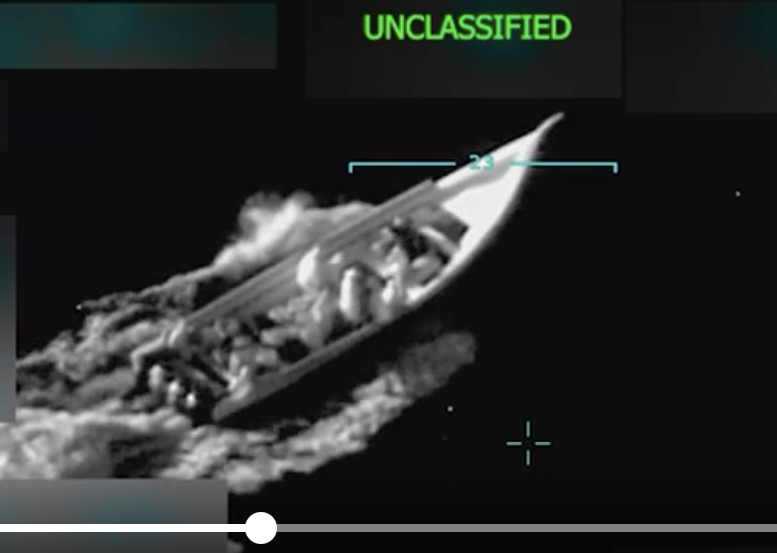
On Tuesday, representatives of the Trump Administration committed murder when they bombed what appeared to be a fishing boat in the international waters of the Caribbean, killing all aboard.
Without providing any evidence, Trump claimed the boat had 11 people and was bringing drugs (“narcoterrorists”) into the U.S. Initially, Secretary of State Marco Rubio had stated the boat was probably headed to Trinidad.
The 11 men killed in a lethal US military strike on an alleged Venezuelan drug carrying vessel earlier this week reportedly departed from San Juan de Unare, a small coastal fishing town- just approximately 65 miles from Trinidad’s northern coast pic.twitter.com/LPDuXHBOus
— Trinidad and Tobago Express Newspapers (@expressupdates) September 4, 2025
The boat sank with all aboard, according to the video Trump shared on Truth Social. (The use of the president’s corporate social network to release official government news is a topic for another day.) So there is no easy way to corroborate or dismiss his claims.
Why am I characterizing this action as “murder”? Murder is defined as “the unlawful killing of a human being with malice“.
First, drug dealing is not a capital offense, even after an individual has been found guilty in a public trial. Moreover, “it is a war crime for troops to deliberately kill civilians — even criminals — who are not directly participating in hostilities.”
Second, it is an “illegal use of war powers” to address an issue with military might that should have been handled by law enforcement. In this case, the US Coast Guard should have taken the lead after the boat entered US waters.
No reported attempt was made to interdict and detain the boatload of people. The video accompanying Trump’s statement suggests that the boat was simply blown up. When asked why the boat wasn’t stopped and its occupants arrested, Trump ducked the question and suggested that the killings would force traffickers to think twice before trying to move drugs to the United States.
Under international standards for law enforcement, lethal force can be used solely as a last resort to meet an imminent threat of death or serious bodily injury. That rule makes sense because law-enforcement officials should ordinarily seek to arrest and prosecute criminal suspects. That is the best way to ensure they have committed the offense in question. It also respects the fact that for most crimes, the penalty upon conviction is a prison sentence, not the death penalty – let alone summary killing without trial.
“Any use of the military [except] in self-defence to an actual attack requires express congressional statutory authorisation. The military attack on the alleged Venezuelan drug traffickers was unconstitutional,” constitutional law expert Bruce Fein told Al Jazeera.
Third, international waters are not subject to national appropriation.
One of the principles of maritime law is the freedom of the high seas. This principle means that all countries have the right to use the oceans for navigation, fishing and other activities without interference from others. The ocean is free for all… The United Nations Convention on the Law of the Sea, adopted in 1982, recognises that the ocean is the ‘common heritage of humankind’, and that ‘No State shall claim or exercise sovereignty or sovereign rights over any part of the Area or its resources’…
If war rules could be applied to suspected terrorists or drug traffickers by a mere declaration of “war”, the risks would be enormous. Law-enforcement officers could shoot anyone anywhere on the mere assertion, never proved in court, that they were part of the group against which a “war” had been declared. What just happened at sea in the Caribbean could be replicated on the streets of New York, London or Paris (emphasis added).
The U.S. military strike on an alleged Venezuelan drug vessel raises serious concerns. Even if you accept the Trump Admin’s framing, this action is legally questionable under both U.S. and international law. ? https://t.co/e45lN6s9AJ
— Juan S. Gonzalez (@Cartajuanero) September 2, 2025
Almost a month ago, Trump told the Pentagon about his claim of “narcoterrorists” from South America. Without evidence, Trump claims that Venezuelan President Nicolás Maduro heads up drug cartels like Tren de Aragua “even though the U.S. intelligence community does not think that is true.”
Labeling the cartels as terrorist groups allows the United States “to use other elements of American power, intelligence agencies, the Department of Defense, whatever, to target these groups if we have an opportunity to do it,” Marco Rubio, the secretary of state and national security adviser, [claimed]. “We have to start treating them as armed terrorist organizations, not simply drug dealing organizations.”
The use of military to target drug dealers for bombing is illegal. The Uniform Code of Military Justice “bars service members from committing unlawful killings.”
Despite the illegality of the action — under both U.S. and international law — Defense Secretary Pete Hegseth and Secretary of State Rubio have indicated they will continue actions like this.
They, and the military members who executed the orders, should stand trial for murder and war crimes. But not until after Trump is no longer in office, so that he cannot pardon them.
Known for gnawing at complex questions like a terrier with a bone. Digital evangelist, writer, teacher. Transplanted Southerner; teach newbies to ride motorcycles. @kegill (Twitter and Mastodon.social); wiredpen.com
















